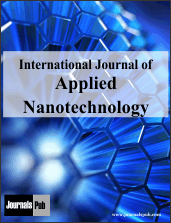Editor Overview
IJAN maintains an Editorial Board of practicing researchers from around the world, to ensure manuscripts are handled by editors who are experts in the field of study.
Publisher
JournalsPubAn Imprint of Dhruv Infosystems Pvt Ltd
A-118, 1st Floor, Sector-63, Noida, U.P. India,Pin-201301
E-mail: [email protected]
(Tel):
(Mob) (+91) 9810078958, +919667725932
Focus and Scope

About the Journal
International Journal of Applied Nanotechnology [2455-8524(e)] is a peer reviewed hybrid open access journal of engineering and scientific journals launched in 2013 serving the fields of reinforced plastics and polymer composites including research, production, processing, and applications. IJAN brings you the details of developments in this rapidly expanding area of technology long before they are commercial realities. It provides a platform to discuss new issues in the area of polymer & composite that are a combination of polymers (i.e., thermosets or thermoplastics) with various continuous and non-continuous reinforcements/fillers, principally added to polymers to improve the material performance. The journal also seeks to advance the quality of research by publishing papers introducing or elaborating on new methods and practice in the field of Chemical Engineering. IJAN is now an open platform to publish articles in open access special issues.
Focus and Scope
Polymer:
- Polymer Chemistry: synthesis of copolymers, block-polymers, polyesters, elastomer, polyolefins, polyamides, polycarbonates, rubber, thermoplastics, thermosets, methods for polymerization, etc.
- Polymer Analysis and advanced characterization of polymers: characterization and analysis of polymers, polymeric materials and polymer additives, polymerization mechanism, measurement of molecular weight, size, conformation, structure, properties and behavior of polymers, separation, spectroscopy, and scattering techniques, structure-property-processing relationships, Characterization, modelling and simulation of molecular and materials properties in bulk, solution, and thin films.
- Polymer Physics and Theory: the development of multiscale modeling methodologies, constitutive equations, and new theories; the implementation of efficient algorithms and machine learning schemes for structure–property relationship quantification; and experimental studies for the preparation and characterization of new polymeric materials, including instrumentation and development of new measuring devices.
- Polymer Processing and Engineering: thermoforming, compression and transfer molding, rotational molding, extrusion, injection molding, blow molding, plastic foam molding, Advanced multiscale processing methods
- Polymer Applications: all kinds of applications (from sensors to actuators, from biomedical engineering to space engineering, and from macro scale down to nano scale) with polymeric materials, proof of concept, structural/system design, performance verification and characterization.
- Biomacromolecules, Biobased and Biodegradable Polymers: polymers of biological origin produced by living organisms, included polysaccharides, proteins, peptides, polyesters, polyamides, etc. polymers from renewable resources and biodegradable polymers
- Circular and Green Polymer Science: biodegradable and bio-based polymers; design and development of green polymer systems; mechanical and chemical recycling and energy recovery of polymer and biopolymer -based systems.
- Polymer Materials: Nanocomposites and hybrid nanomaterials, Polymer blends, films, fibres, networks and porous materials
- Polymer Synthesis, Modification and Self-assembly: Including designer polymer architectures, mechanisms and kinetics, and supramolecular polymerization
- Technological Applications: Polymers for energy generation and storage, Polymer membranes for separation technology, Polymers for opto- and microelectronics
- Polymer structures: Polymer Blend, nanocrystal, molecular orientation, polyaromatics, polymer backbone
- Physical properties of polymers: Phase Transformation Temperatures, Density, Specific Gravity, Thermal Conductivity, Linear Coefficient of Thermal Expansion, Electrical Conductivity and Resistivity, Magnetic Permeability, Corrosion Resistance
- Polymer surface and interfaces: chemical/physical modification of polymer surfaces, self-assembly of polymer chains, nano-particles or micro-particles, nano-mechanical measurements of polymer films, functional polymer surfaces with special wettability, capillary phenomena on polymeric surfaces, mechanical instability (buckling, wrinkling, etc.) of soft polymer surfaces and interfaces, interfacial rheology, polymer tribology, numerical simulations on polymer surfaces, bioinspired polymer materials, biomolecular surfaces and interfaces, characterization methods for interfacial phenomena in polymers, polymer thin films deposited from the vapor phase
- Functional polymers: photoactive polymer, conductive polymer, sensitive polymer, polymer modification, hydrogels, polymeric micelles, block copolymer, polymer nanocomposites, polymer biomaterial
- Supramolecular polymers: graft copolymers, telechelic polymers, hydrogen bonding brush polymer (HBP), hyperbranched polymer, polymer grafts.
- Renewable polymer synthesis
- Macromolecular structure and function
- Synthesis and application of novel polymers
- Reactions and chemistry of polymers
- Polymerization mechanisms and kinetics
- Higher-order polymer structures
- Structure-property relationships of polymers
Open Access Statement
IJAN is an open-access (OA) publication which provides immediate open access to its content on the principle that making research freely available to the public supports a greater global exchange of knowledge. All published works will be available to a worldwide audience, free, immediately upon publication. Publication in the journal is subject to payment of an article processing charge (APC). The APC serves to support the journal and ensures that articles are freely accessible online in perpetuity under a Creative Commons licenses.
Publication Ethics Statement
IJAN fully adhere to Code of Conduct of Publication Ethics (COPE) and to its Best Practice Guidelines. The Editorial Team enforces a rigorous peer-review process with strict ethical policies and standards to ensure the addition of high-quality scientific studies to the field of scholarly publication. In cases where ctit becomes aware of ethical issues, it is committed to investigating and taking necessary actions to maintain the integrity of the literature and ensure the safety of research participants. Click here to read more about the Research & Publication virtue ethics
Content Disclaimer
All IJAN the information’s, opinions, and views mentioned here represents the authors and the contributions of the articles. Publication of articles, advertisements, or product information does not constitute endorsement or approval by the journal. cannot be help responsible for any error or consequences while using the information updated in this journal. Although every effort is done by ctit to see that there’s no any inaccurate data, misleading data, opinion or statement within the journal, the data and opinions appearing in the articles are the responsibility of the contributors concerned.



